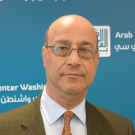Speakers

Dina Esfandiary
Senior Advisor for Middle East and North Africa
International Crisis Group

Barbara Slavin
Distinguished Fellow
Middle East & North Africa, Stimson Center

Dania Thafer
Executive Director
Gulf International Forum
Moderator
About the Webinar
On March 30, 2023, Arab Center Washington DC (ACW) organized a webinar titled “The Global Significance of the China-Brokered Saudi-Iran Deal.” Panelists were Dina Esfandiary, Senior Advisor for the Middle East and North Africa at International Crisis Group; Imad K. Harb, Director of Research and Analysis at ACW; Barbara Slavin, Distinguished Fellow for the Middle East and North Africa at the Stimson Center; Dania Thafer, Executive Director of Gulf International Forum; and Kristian Coates Ulrichsen, Non-Resident Senior Fellow at ACW. Daniel Brumberg, Non-Resident Senior Fellow at ACW, moderated the event.
Kristian Coates Ulrichsen started off the discussion by speaking about Saudi Arabia’s motivation in restoring relations with Iran and in choosing China as a mediator. Ulrichsen argued that the agreement reflects a new realism in Saudi policy toward Iran away from antagonism and toward de-escalation, a realism that is in large part driven by Saudi Arabia’s desire for stability as it focuses in the coming years on domestic issues related to its Vision 2030 plan.
Dina Esfandiary focused on Iran’s perspective in signing this agreement with Saudi Arabia, and chalked the move up to both international and domestic issues. On the international front, Esfandiary said, Iran is trying to put in place layers of security against future isolation like what it has experienced in the years since the US withdrawal from the Iran nuclear deal. Domestically, she argued, Iran is trying to use the deal to inject a bit of hope into its discontented population and to thereby offer some stability as it prepares for what will likely be a complicated succession process once aging Supreme Leader Ali Khamenei passes away.
Dania Thafer discussed how the matter of great power competition between the US and China relates to the recent agreement. Thafer argued that although the international system is evolving and multipolarity is now quite real, the new agreement will not necessarily change the US-Saudi relationship; nor does it signal China’s eclipse of the US or a solution to all of Saudi Arabia and Iran’s differences. She therefore called this a “wait and see” moment.
Imad K. Harb provided an analysis of China’s position, which he argued involves defending and supporting its own interests, including its desire to reemerge as a world power. Harb discussed China’s recent domestic economic woes, including slowing growth and declining birth rates, arguing that because it is highly dependent on the international economy it is likely looking to secure its supply of energy resources by brokering this agreement. Harb added that although China may replace the US role in the region economically, it is not willing or able to provide the same security agreements that the US does, nor is it ready to provide the larger security umbrella that Saudi Arabia has been trying to get the US to guarantee.
Barbara Slavin examined the reasons behind the choice of China to mediate the agreement, including US mistakes with its Middle East allies and China’s strong economic relationships in the region, which have garnered it significant soft power. Slavin argued that the agreement can be understood in part as two significant fossil fuel producers shoring up ties with their biggest consumer, one that has already demonstrated its willingness to bust sanctions. She stated that the deal may be part of a “look East” strategy, and that the US needs to rethink its approach, particularly to sanctions.
Featured image credit: China Daily



